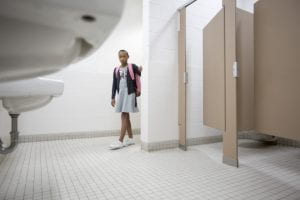April 6, 2022 | Kimberly Randall, Lister Hill Center Staff

Background
The purchase of menstruation products has historically caused financial hardship to a large percentage of the population, particularly individuals and families below the poverty line. In Alabama, feminine hygiene products are not eligible to be covered under SNAP or WIC. Last year, Illinois became the first state to lift this restriction to allow the purchase of tampons and menstrual pads using SNAP benefits; however, no such legislation has been proposed in Alabama.
Currently, only five states require or provide funds for public schools to offer menstrual products at no cost to students, while 37 states have pending legislation to do so. Legislation in Alabama was proposed in 2020 to obtain funding for period products in schools that passed the House of Representatives but stalled in the Senate.
Bill
HB50, sponsored by Representative Rolanda Hollis (D-Birmingham), creates a grant program beginning in the 2022-23 school year for schools to apply for funding to purchase feminine hygiene products for students. Eligible schools must receive Title 1 funding and house students in grades 5-12. Funds will be reimbursed to schools that apply for the program and purchase supplies for students, who will be able to receive the products from a female counselor, teacher, or nurse in their schools. The bill has allocated $200,000 for the first year. The State Department of Education will administer the program.
Impact
According to the Alliance for Period Supplies, a non-profit started by feminine hygiene brand Kotex, 1 in 5 women and girls between the ages of 11 and 44 live below the poverty line in Alabama. Along with 29 other states, Alabama taxes period products at a sales tax rate of up to 11%. According to a study completed at St. Louis University, two-thirds of women reported an inability to afford period products in the past year. At the same time, 21% of respondents stated that they faced financial hardship concerning period products every month.
Lack of access to period products can impact the education of students. In a national survey, 1 in 4 students reported skipping class or leaving school early due to lack of access to period products, often due to financial difficulties. Individuals often resort to paper towels, toilet paper, or rags when proper menstruation products are unavailable. According to the University of Michigan, “when menstruators resort to unhygienic alternatives, they are vulnerable to harmful physical and mental outcomes [and are at a higher risk for] urogenital infections, such as urinary tract infections and bacterial vaginosis.” Additionally, the emotional toll caused by a lack of access to proper hygiene products can lead to depression, anxiety, and overall elevated distress. Providing menstrual products would help alleviate students’ mental and financial across the state.
Next Steps
HB50 passed unanimously in both the House of Representatives and the Senate on April 5, 2022, and now advances to Governor Kay Ivey’s desk to be signed into law. If you want to make your voice heard on this or future legislation, click here to identify your elected officials.
Don’t know what to say? Check out this American Civil Liberties Union guide on drafting a letter to your government officials.
Learn More
Want to learn more on this issue? Women in Training is a non-profit organization located in Montgomery, Alabama, dedicated to providing menstruation education and period products to underserved women, girls, and nonbinary youth in packages coined WITKITS. Started in 2019 by twin sisters Brooke and Breanna Bennett, the organization also facilitates programs to help girls break the generational cycle of poverty, including:
- WIT Leadership Development Circle to develop a select group of high school young women into compassionate and culturally aware global leaders
- WIT Girls STEAM Initiative to expose girls to careers in Science, Technology, Engineering, Arts, and Mathematics
- WIT Mentor Program to match high school girls with university students or professional women to guide them through the educational and early career stages



